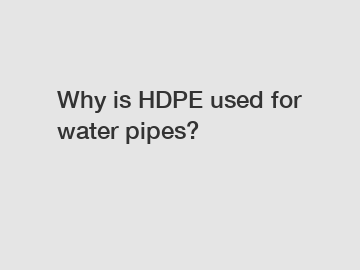Jan. 27, 2024
Rubber & Plastics
Why is HDPE used for water pipes?
In the world of plumbing and water distribution, High-Density Polyethylene (HDPE) has gained immense popularity as a material for water pipes. With its exceptional strength, durability, and versatility, HDPE has become the go-to choice for many water infrastructure projects. This article will delve into the reasons why HDPE is used for water pipes and highlight its numerous advantages.
High-Density Polyethylene: An Overview.

HDPE is a type of thermoplastic made from petroleum. It is known for its high strength-to-density ratio, making it incredibly durable and resistant to impacts, cracks, and chemical corrosion. These properties contribute to its longevity and ability to withstand harsh environmental conditions, making it an ideal material for water pipes.
Advantages of HDPE for Water Pipes.
1. Flexibility:
One of the key advantages of HDPE is its flexibility. HDPE pipes are known for their exceptional flexibility, allowing for easy installation and use even in challenging terrains. This flexibility helps eliminate the need for extra fittings, reducing potential leak points and facilitating faster installation, saving both time and money.
2. Leakage-free joints:
HDPE pipes utilize heat fusion to join sections of pipe together permanently. Heat fusion creates a seamless and fully integrated joint, eliminating any weak points or chances of leakage. Compared to traditional materials like PVC or concrete, which often require additional joints, HDPE provides a reliable and leak-free solution.
3. Durability and longevity:
HDPE pipes have a long service life and are designed to withstand the test of time. Their resistance to UV radiation, corrosion, and abrasion ensures they can be installed in various environments without degradation. HDPE pipes have been known to last up to 100 years, significantly reducing the need for frequent replacements and maintenance.
4. Sanitary and safe:
Water pipes made from HDPE are safe for potable water systems. HDPE pipes are non-toxic, resistant to mold, bacteria, and viruses, making them highly suitable for drinking water distribution. Additionally, HDPE does not release harmful substances into the water, ensuring the highest level of safety for consumers.
5. Cost-effective:
While the initial installation cost of HDPE pipes may be slightly higher compared to traditional materials, its long-term cost-effectiveness outweighs this factor. HDPE's durability and resistance to corrosion and leaks significantly reduce ongoing maintenance and replacement costs. Moreover, its lightweight nature makes transportation and handling more efficient, further reducing costs.
Conclusion.
HDPE has gained prominence as the material of choice for water pipes due to its exceptional properties, including flexibility, leak-free joints, durability, sanitation, and cost-effectiveness. These benefits have made HDPE pipes the preferred option for water infrastructure projects worldwide.
If you are looking to install or upgrade your water distribution system, consider using HDPE pipes to ensure a reliable and long-lasting solution. For more information or assistance, please do not hesitate to contact us.
(Contact us for any further inquiries or for assistance on water pipe installations using HDPE.).
Contact us to discuss your requirements of HDPE double wall, floaters manufacturer, yellow hdpe pipe. Our experienced sales team can help you identify the options that best suit your needs.
Previous: FKM Compound Explained: Your Ultimate Guide to Its Properties, Advantages, and Popular Applications
If you are interested in sending in a Guest Blogger Submission,welcome to write for us!
All Comments ( 0 )